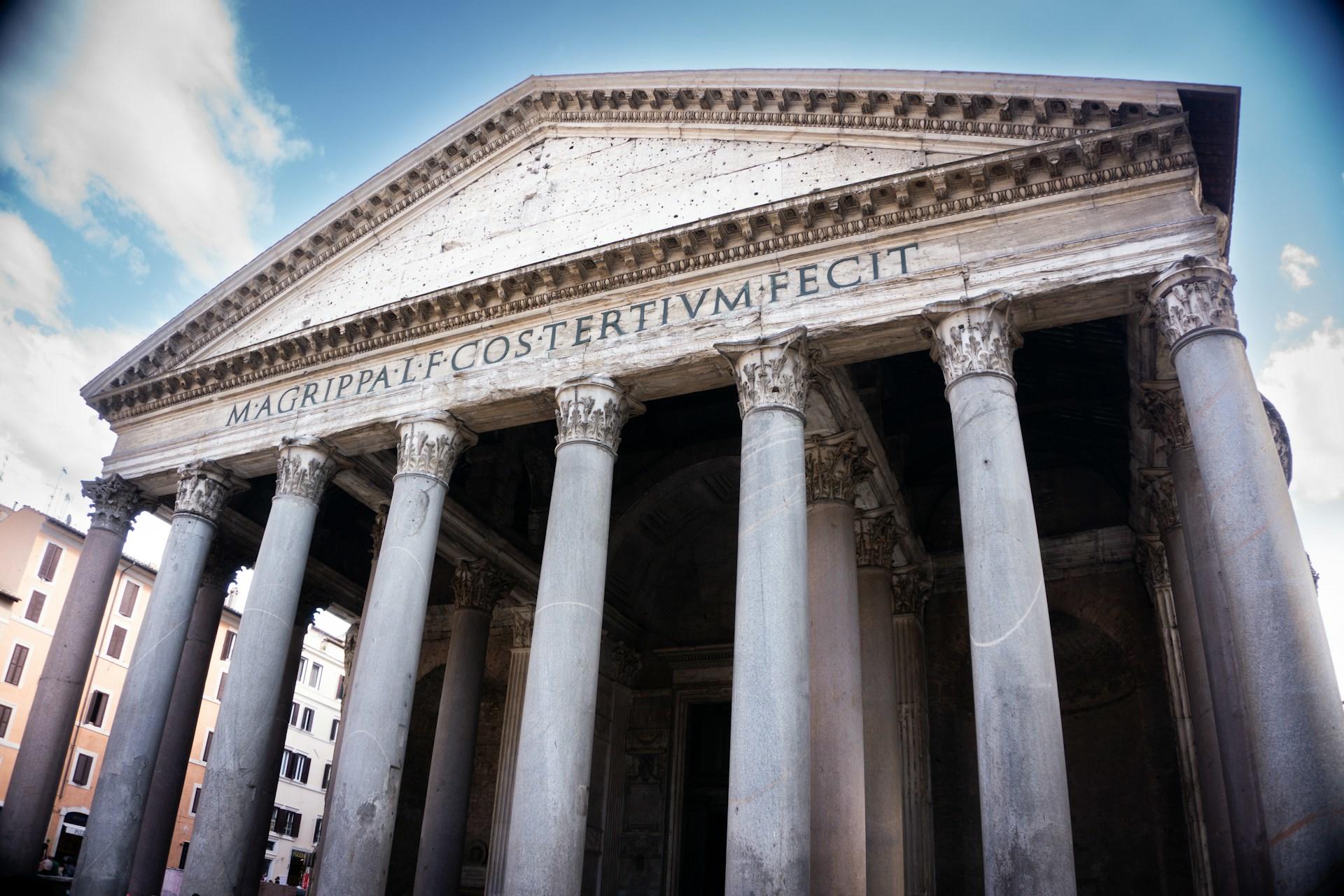A priori, et cetera, a posteriori, alter ego, ad hoc, nota bene, mea culpa, etc.
You might have heard some Latin in your time; even as an English speaker, the roots of our language share common ground with the written and spoken language of ancient Rome.
As a result, the Latin proverb has in many cases become one of the default ways of displaying one’s wisdom or intellect in conversation or scholarly musings.
We have picked some of the most beautiful Latin phrases, some used often, others much more rarely, which we've broken down in these categories:
- Latin phrases about fate and time
- Latin phrases about life
- Latin phrases of advice
- Latin phrases about love
- philosophical latin phrases

Summary of Key Latin Phrases and Sayings
| Latin Quote | English Translation |
|---|---|
| Alea jacta est | The die is cast |
| Audaces fortuna juvat | Fortune favors the bold |
| Deus ex machina | God from the machine |
| Vulnerant omnes, ultima necat | They all wound and the last kills |
| Ad vitam aeternam | To eternal life |
| Fluctuat nec mergitur | (She) is tossed by the waves but doesn't sink |
| Ave, Imperator, morituri te salutant | Hail, Emperor, those who are about to die salute you |
| Amicus Plato sed major amicus veritas | Plato is my friend, but the truth is a better friend |
| Aurea mediocritas | The golden mean |
| Beati pauperes spiritu | Blessed in spirit (are) the poor |
| Carpe diem | Seize the day |
| Errare humanum est | To err is human |
| Nosce te ipsum | Know thyself |
| Quae sunt Caesaris, Caesari | That which is God's, to God; that which is Caesar's, to Caesar |
| Habeas Corpus | That you have the body |
| Homo homini lupus | A man is a wolf to another man |
| Veto | I forbid |
| Amor vincit omnia | Love conquers all |
| Ad vitam aeternam | To eternal life |
| Cogito, ergo sum | I think, therefore I am |
| Ex nihilo nihil | Nothing comes from nothing |
| Panem and circenses | Bread and circuses |
Latin Phrases About Fate and Time
It’s not uncommon for Latin sayings to reference the themes of fate, destiny and the inevitable march of time, which we must all reconcile as we go through life.

The mythos of Latin-speaking cultures live on today in the phrases that we often parrot in our day-to-day lives.
“Alea jacta est”: The die is cast
Certainly one of the most famous Latin quotes. These are the words uttered by Caesar when crossing the Rubicon with his army, in spite of the fact that a Roman law stipulated that he had to discharge his soldiers before crossing the river.
By disrespecting this order, Caesar was brought into conflict with the Roman Senate. The government considered his actions an insurrection, treason, and declaration of war. The idiom “crossing the Rubicon” is also used in English to suggest passing a point of no return. Another way of phrasing this is with the popular expression “come what may”.
Another way of thinking of this saying is as the Latin words for best or worst… it’s happened now, so we have to go along with it.
We could have chosen from many Latin war phrases, but this one is one of the most poignant.
“Audaces fortuna juvat”: Fortune favors the bold
Adapted from Virgil's Aeneid, this proverb, also expressed as “Fortune favors the brave” and “Fortune favors the strong”, encourages us to force a change and brave the difficulties. It is unsurprising that historically this phrase has often been used in a military context. “Fortuna” in English refers to luck or its personification, a Roman goddess.
Audacity, however, is not always synonymous with success, but like all proverbs, you must know how to use it wisely.
Nevertheless, this is up there with some of the coolest Latin phrases, and many people use it to this day to inspire confidence in themselves and their peers.
“Deus ex machina”: God from the machine
Of all the mottos in Latin on this list, “Deus ex machina” is possibly the most well known due to its constant appearance in our critique of media.
Originally a translation of a Greek expression, it makes reference to the theater and the intervention of gods or goddesses, brought over the stage using special equipment. The divine intervention solved all the problems at the end of the play.
Nowadays, the expression is used when a situation is resolved thanks to an element that was unexpected until that moment. The expression is often used pejoratively for an incredible miracle which is poorly integrated into a story to make a happy ending.
“Vulnerant omnes, ultima necat”: They all wound and the last kills
We tend to love Latin phrases in Latin that imply a dark truth; this is one of the best examples of a quote that does exactly that.
This Latin expression is often inscribed on old sundials or public clocks. It is a way of remembering the passing of time and that every hour could be someone's last.
It teaches us to value our time and reminds us that we are not immune to the effects of time.
Latin Phrases About Life
As English speakers, we love Latin phrases about love and life that inspire us and keep us moving through our trials and tribulations.

“Ad vitam aeternam”: To eternal life
We can swear a love or friendship "ad vitam aeternam", one that is forever and ever.
However, this phrase isn’t always interpreted as exclusively Latin love words.
According to beliefs and traditions, this proverb is rather pessimistic, as it implies that we are dead. Indeed, eternal life is linked to Paradise for worthy Christians or eternal hell for sinners. Another way of translating this phrase is "to life everlasting".
Discover the best dictionaries for translating Latin.
"Fluctuat nec mergitur”: (She) is tossed by the waves but doesn't sink
A motto used by the city of Paris since 1358 by the Guild of Boatsmen along the river Seine. At a time when access to the open sea was crucial for the city, boats were the most effective means of transport.
It became the official motto of Paris in 1853, it accompanies the ship on the coat of arms of Paris. Henri Tausin explains perfectly why this motto was chosen.
The motto recalls “the dangers that Paris has seen, the terrible revolutions that have agitated it, the crises of all kinds it has suffered” and expresses “the idea of vitality, strength, perpetuity that characterises the long and glorious existence of this city.”
This is not the only example of a large group of people using Latin phrases for love of someone or something, but it is definitely a good one.
Learn all about the languages derived from Latin.
“Ave, Imperator, morituri te salutant”: Hail, Emperor, those who are about to die salute you
These words were chanted by the gladiators in front of the Imperial Box before the start of the Games, according to Suetonius. The Romans loved the Circus Games, especially the very bloody fighting of death row prisoners, slaves, or even voluntary barbarians.
If the gladiator lost, it was the public who decided whether he lived or died by lowering or raising their thumb. The motto recalls the pride of the gladiators, who had only one thing to save: their lives.
Compared with other languages, a Latin quote about death is certainly sure to send a shiver down the spines of those who hear it. You can tell a Latin quote refers to death because in Latin words, death is represented by ‘mor’ such as in this quote and “Memento mori”.

Latin Phrases of Advice
Some of the best Latin words are Latin words for success and the associated advice that they can impart to their recipients.

“Amicus Plato sed major amicus veritas”: Plato is my friend, but the truth is a better friend
You might have expected to see some famous quotes from Plato, but did you expect to see one about him?
This is a quote from Aristotle, found in his book Nicomachean Ethics. As a disciple of Plato, he was a great admirer of the philosopher. However, despite his admiration, he did not blindly follow the words of his master but dared to question his teaching in order to come closer to the truth.
Today, these words can be used by any person questioning or taking a stand against their teacher.
“Aurea mediocritas”: The golden mean
Taken from the Odes of Horace, a Latin poet, these verses are not as pejorative as one might think. The “golden mean” or “golden middle way” implies that one should be content to lead a peaceful life without the hassle and worry that opulence would bring.
Excess of any variety is seen as dangerous, life is therefore about finding the right balance. This proverb is similar to the more commonly used phrase in English “a happy medium”.
“Beati pauperes spiritu”: Blessed in spirit (are) the poor
The seventh verse from the Sermon on the Mount (Gospel according to Matthew, V, 3) and the seventh Beatitude, today these words commend those that succeed without intelligence. The phrase teaches us to be poor in the economic sense rather than a spiritual sense by learning to detach oneself from worldly goods.
Have you wondered about the origins of the Latin alphabet?
“Carpe diem”: Seize the day
From a poem by Horace, the complete phrase is “carpe diem quam minimum credula postero”, literally meaning “be the least credulous possible for the next day”. It is generally translated into English as “live in the present without worrying about tomorrow” to keep the poetic genre.
Horace was known to be an epicurean and therefore enjoyed the pleasures life had to offer him. This same idea comes up in Ronsard's poems, and in particular Sonnets for Helen: “Gather today the roses of life”. It can be interpreted as an incentive to enjoy every moment of such a short human existence.
“Errare humanum est”: To err is human
The complete phrase is "errare humanum est, persevare diabolicum", which means "to err is human, but to persist in error (out of pride) is diabolical". It is often attributed to Seneca, but it is known to have existed before.
It is a philosophical maxim to forgive the mistakes made by humans who are not perfect. However, the maxim is also about understanding our errors, so we can improve. The second part explains this point well: being stubborn about your errors is inexcusable.
The maxim can be compared to the writing of a more recent author, John Powell, who says that "the only real mistake is the one from which we learn nothing".
How well do you know your Latin declensions?
“Nosce te ipsum”: Know thyself
Translated from ancient Greek, this expression is one of the three precepts engraved at the entrance of the temple of Delphi and the oldest according to Plato.
It is a sacred formula of humanism that requires man to become aware of his own existence and consciousness. “Know Thyself” invites you to get to know one another better and be aware of your strengths and weaknesses.
A rather complex sentence, which stresses the importance of knowing the Latin declensions by heart!
Latin Words of Wisdom
As we mentioned in the beginning, Latin is often a language of academic prestige and a sign of intelligence. It should therefore come as no surprise that many Latin quotes contain age-old wisdom that still holds true to this day.

“Quae sunt Caesaris, Caesari”: That which is God's, to God; that which is Caesar's, to Caesar
If you’re a Christian, this is possibly one of the best quotes in Latin that you can use to impart Jesus’ teaching. It is used to say that we must recognize the responsibility of a gesture to a person, whether positive or negative.
According to the Gospel, it was Jesus who said "Give back to Caesar what is Caesar's and to God what is God's" after the Pharicians asked him if they should pay the tax.
Habeas Corpus: That you have the body
Latin phrases love to be short and sweet, but they are often abbreviated from longer passages.
The full Latin phrase is "that you have the person for the purpose of subjecting him/her to (examination)" (habeas corpus ad subjiciendum). It is an Anglo-Saxon institution that serves to guarantee the individual freedom of citizens by protecting him/her against arbitrary arrests.
Voted in 1679 in England, the Habeas Corpus Act is a reaction to attempts at monarchical absolutism.
“Homo homini lupus”: A man is a wolf to another man
“Man is wolf to man” means that man is his own worst enemy. This Latin quote is often used in Latin class.
We see it used for the first time by Plautus in his comedy Asinaria.
From a philosophical point of view, it is a pessimistic view of man, an unscrupulous, selfish and individualistic being, who does not hesitate to destroy others for his own success.
“Veto”: I forbid
Authority alone does not lend value to an idea… Hence, the ‘veto’.
Originally, the veto was a way of opposing a magistrate, regardless of rank, or a decision of the Roman Senate.
Today, the term still denotes opposition to a decision. It is used by the United Nations Security Council for countries contesting decisions. If a country exercises their veto power, the proposal is rejected.
You will find similar quotes in the dozens of Latin languages used throughout the world today!
Latin Phrases About Love
Love is a central part of human existence. In its many forms and expressions, it's a timeless and universal theme that has been explored extensively in Latin literature and philosophy, from Ovid's "Ars Amatoria" to Virgil's "Eclogues".

Love is a central part of human existence. In its many forms and expressions, it's a timeless and universal theme that has been explored extensively in Latin literature and philosophy, from Ovid's "Ars Amatoria" to Virgil's "Eclogues".
The Latin language, with its poetic elegance and depth, offers a rich repository of phrases that capture the essence of love, illustrating its power, complexity, and enduring nature.
"Amor vincit omnia": Love conquers all
This phrase, derived from Virgil's Eclogues, encapsulates the omnipotent force of love, capable of overcoming any obstacle. It reflects the Roman belief in the transformative power of love, which can transcend social, political, and personal barriers. This idea is mirrored in countless stories and poems from ancient Rome, where love often emerges as a central, driving force.
"Ad vitam aeternam": To Eternal Life
This Latin phrase about love captures the timeless and enduring nature of love. It expresses how love is not confined by time, promising an everlasting bond in the mortal realm. The eternal aspect of live is indeed a recurring theme in Roman poetry and philosophy, reflecting the importance placed on loyalty and devotion.
Philosophical Latin Phrases
Philosophers are prized for their ability to not only observe and make sense of the metaphysical, but also for their ability to eloquently word their insights so that the common rabble can understand their intricate conclusions.
Below are both famous examples of the observation and simplification of truth in our lives.

“Cogito, ergo sum”: I think, therefore I am
This quote is a Latin philosophical proposition coined by René Descartes in his Discourse of Method (1637) and appeared originally in French in the original French “je pense, donc je suis”. This idea is also referred to as “the cogito”.
The idea is that existence is the only certainty that resists any doubt. Only the existence of the thinking human being is certain at the beginning. Descartes taught to completely reform knowledge.
Ex nihilo nihil: Nothing comes from nothing
These verses are attributed to Lucretius and were taken up by Voltaire in his book Philosophical Dictionary. Speaking of dictionaries, have you ever thought of consulting an English-Latin dictionary to help you with your revision?
The complete phrase is “ex nihilo nihil, in nihilum posse reverti”, which means “nothing comes from nothing, nothing can revert to nothing”. Nothing can be created or destroyed.
In English, the meaning has evolved far from the original translation: “He that wills the end wills the means”. If you are determined to do something, you will find a way.
“Panem and circenses”: Bread and circuses
Literally “bread and circus games”, the Latin expression denounces the distribution of bread during games in order to attract the good graces of the people. The expression is taken from Juvenal's Satire X.
Today, it is used to show the skewed relationship between people who are satisfied with “bread and games” without worrying about larger issues and the political powers that may be tempted to exploit these trends in the short term.
Now that we've explored some of the most powerful Latin quotes, you might start to notice them more in your everyday life! Covering universal themes, such as fate and time, inspiration, wisdom, love and the meaning of life, the ubiquity of these quotes demonstrates the enduring impact of the Latin language on culture and modern thought and expression.
Now get the answers to every question about Latin you've ever had.
Check out our other articles in the Superprof blog if you want to know more about Latin or other subjects!
















I would also love to know the correct pronunciation of these Latin phrases? Even the use of the hard or soft ‘C’ .. l thank you.
Hello Freddie, thanks for the info! It would be great for a future article and we will keep it in mind.
Does anyone know a Latin saying, at different stages of our aging process, we resemble different family members. Someone said it to me and I wish I wrote it down
Hello Pj, thank you for your comment! A phrase similar to the one you might be searching for is, “Vultus est index animi et aetatum.” This roughly translates to, “The face is the index of the soul and of the ages.” If you’d like to learn additional Latin phrases, feel free to reach out to a Superprof Latin tutor today to discover more! 📚